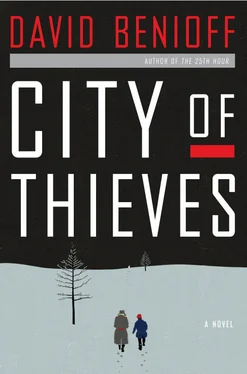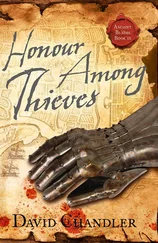After months of bombing raids we could identify the various German planes by the pitch of their engines. That night it was the Junkers 88s, as it had been for weeks, replacing the Heinkels and Dorniers that our fighters had gotten good at gunning down. As wretched as our city had become in daylight, after dark there was a strange beauty in the siege. From the roof of the Kirov, if the moon was out, we could see all of Leningrad: the needlepoint of the Admiralty tower (splashed with gray paint to obscure it from the bombers); the Peter and Paul Fortress (spires draped with camouflage netting); the domes of Saint Isaac’s and the Church on Spilled Blood. We could see the crews manning the antiaircraft guns on the rooftops of neighboring buildings. The Baltic Fleet had dropped anchor on the Neva; they floated there, giant gray sentries, firing their big guns at the Nazi artillery emplacements.
Most beautiful were the dogfights. The Ju88s and the Sukhois circled above the city, invisible from below unless they were caught in the eyes of the powerful searchlights. The Sukhois had large red stars painted on the undersides of their wings so our antiaircraft crews wouldn’t shoot them down. Every few nights we’d see a battle spotlit as if for the stage, the heavier, slower German bombers banking hard to let their gunners get a bead on the darting Russian fighters. When a Junkers went down, the plane’s burning carcass falling like an angel cast from heaven, a great shout of defiance rose up from rooftops all across the city, all the gunners and firefighters shaking their fists to salute the victorious pilot.
We had a little radio on the roof with us. On New Year’s Eve we listened to the Spassky chimes in Moscow playing the “Internationale.” Vera had found half an onion somewhere; she cut it into four pieces on a plate smeared with sunflower oil. When the onion was gone, we mopped up the remaining oil with our ration bread. Ration bread did not taste like bread. It did not taste like food. After the Germans bombed the Badayev grain warehouses, the city bakeries got creative. Everything that could be added to the recipe without poisoning people was added to the recipe. The entire city was starving, no one had enough to eat, and still, everyone cursed the bread, the sawdust flavor, how hard it got in the cold. People broke their teeth trying to chew it. Even today, even when I’ve forgotten the faces of people I loved, I can still remember the taste of that bread.
Half an onion and a 125-gram loaf of bread split four ways—this was a decent meal. We lay on our backs, wrapped in blankets, watching the air-raid blimps on their long tethers drifting in the wind, listening to the radio’s metronome. When there was no music to play or news to report, the radio station transmitted the sound of a metronome, that endless tick-tick-tick letting us know the city was still unconquered, the Fascists still outside the gate. The broadcast metronome was Piter’s beating heart and the Germans never stilled it.
It was Vera who spotted the man falling from the sky. She shouted and pointed and we all stood to get a better look. One of the searchlights shone on a parachutist descending toward the city, his silk canopy a white tulip bulb above him.
“A Fritz,” said Oleg Antokolsky, and he was right; we could see the gray Luftwaffe uniform. Where had he come from? None of us had heard the sounds of aerial combat or the report of an AA gun. We hadn’t heard a bomber passing overhead for close to an hour.
“Maybe it’s started,” said Vera. For weeks we’d been hearing rumors that the Germans were preparing a massive paratrooper drop, a final raid to pluck the miserable thorn of Leningrad from their advancing army’s backside. At any minute we expected to look up and see thousands of Nazis drifting toward the city, a snow-storm of white parachutes blotting out the sky, but dozens of searchlights slashed through the darkness and found no more enemies. There was only this one, and judging from the limpness of the body suspended from the parachute harness, he was already dead.
We watched him drift down, frozen in the searchlight, low enough that we could see that one of his black boots was missing.
“He’s coming our way,” I said. The wind blew him toward Voinova Street. The twins looked at each other.
“Luger,” said Oleg.
“Luftwaffe don’t carry Lugers,” said Grisha. He was five minutes older and the authority on Nazi weaponry. “Walther PPK.”
Vera smiled at me. “German chocolate.”
We ran for the stairway door, abandoning our firefighting tools, racing down the dark stairwell. We were fools, of course. A slip on one of those concrete steps, with no fat or muscle to cushion the fall, meant a broken bone, and a broken bone meant death. But none of us cared. We were very young and a dead German was falling onto Voinova Street carrying gifts from das Vaterland.
We sprinted through the courtyard and climbed over the locked gate. All the streetlamps were dark. The entire city was dark—partly to make the job tougher for the bombers and partly because most of the electricity was diverted to the munitions factories—but the moon was bright enough to see by. Voinova was wide open and deserted, six hours into curfew. No cars in sight. Only the military and government had access to gasoline, and all the civilian autos had been requisitioned during the first months of the war. Strips of paper crossed the shop windows, which the radio told us made them more resistant to shattering. Maybe this was true, though I had walked by many storefronts in Leningrad where nothing remained in the window frame but a dangling strip of paper.
Out on the street we looked into the sky but could not find our man.
“Where’d he go?”
“You think he landed on a roof?”
The searchlights were tracking the sky, but they were all mounted on top of tall buildings and none of them had an angle to shine down Voinova Street. Vera tugged on the collar of my greatcoat, a vast old navy coat inherited from my father and still too big for me, but warmer than anything else I owned.
I turned and saw him gliding down the street, our German, his single black boot skidding over the frozen pavement, the great canopy of his white parachute still swollen in the wind, blowing him toward the gates of the Kirov, his chin slumped against his chest, his dark hair flecked with crystals of ice, his face bloodless in the moonlight. We stood very still and watched him sail closer. We had seen things that winter no eyes should ever see, we thought we were beyond surprise, but we were wrong, and if the German had drawn his Walther and begun shooting, none of us would have been able to get our feet moving in time. But the dead man stayed dead and at last the wind gave out, the parachute deflated, and he slumped to the pavement, dragged another few meters facedown in final humiliation.
We gathered around the pilot. He was a tall man, well built, and if we had seen him walking around Piter in street clothes, we would have known him at once for an infiltrator—he had the body of a man who ate meat every day.
Grisha knelt and unholstered the German’s sidearm. “Walther PPK. Told you.”
We rolled the German onto his back. His pale face was scuffed, the skin scraped on the asphalt, the abrasions as colorless as the intact skin. The dead don’t bruise. I couldn’t tell if he had died frightened or defiant or peaceful. There was no trace of life or personality in his face—he looked like a corpse who had been born a corpse.
Oleg stripped off the black leather gloves while Vera went for the scarf and goggles. I found a sheath strapped to the pilot’s ankle and pulled out a beautifully weighted knife with a silver finger guard and a fifteen-centimeter single-edge blade etched with words I could not read in the moonlight. I resheathed the blade and strapped it to my own ankle, feeling for the first time in months that my warrior destiny was at last coming true.
Читать дальше












